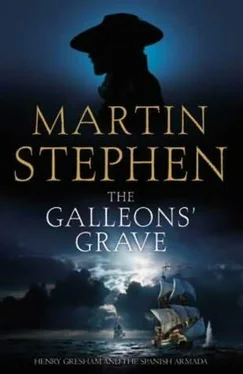Martin Stephen - The galleon's grave
Здесь есть возможность читать онлайн «Martin Stephen - The galleon's grave» весь текст электронной книги совершенно бесплатно (целиком полную версию без сокращений). В некоторых случаях можно слушать аудио, скачать через торрент в формате fb2 и присутствует краткое содержание. Жанр: Исторический детектив, на английском языке. Описание произведения, (предисловие) а так же отзывы посетителей доступны на портале библиотеки ЛибКат.
- Название:The galleon's grave
- Автор:
- Жанр:
- Год:неизвестен
- ISBN:нет данных
- Рейтинг книги:4 / 5. Голосов: 1
-
Избранное:Добавить в избранное
- Отзывы:
-
Ваша оценка:
- 80
- 1
- 2
- 3
- 4
- 5
The galleon's grave: краткое содержание, описание и аннотация
Предлагаем к чтению аннотацию, описание, краткое содержание или предисловие (зависит от того, что написал сам автор книги «The galleon's grave»). Если вы не нашли необходимую информацию о книге — напишите в комментариях, мы постараемся отыскать её.
The galleon's grave — читать онлайн бесплатно полную книгу (весь текст) целиком
Ниже представлен текст книги, разбитый по страницам. Система сохранения места последней прочитанной страницы, позволяет с удобством читать онлайн бесплатно книгу «The galleon's grave», без необходимости каждый раз заново искать на чём Вы остановились. Поставьте закладку, и сможете в любой момент перейти на страницу, на которой закончили чтение.
Интервал:
Закладка:
In the end there was no plan. No order. Drake simply led a mad, frontal assault on the Spaniards. It was pure folly. And it caught Spain completely by surprise.
The sun was shining from a cloudless sky over Cadiz. A decent wind kicked over the surface of the sea, making it seem busy and useful. The heat of midday had passed, and the better folk were emerging in the late afternoon to take the air and to be seen. Down at the waterfront a troop of actors were playing to a large crowd whose hoots, cheers and jeers were faintly audible on the wind. The wine shops were busy servicing the needs of the sailors, but it was too early for them to have become troublesome.
In the town there was music, laughter. 'Look!' said the pretty wife of a Cadiz merchant, 'More ships!' Then she giggled, as if ashamed that a woman should notice such things. The merchant turned his gaze out to sea. Ships, indeed. A line of ships, fourteen or fifteen great ships standing in for the harbour, the spread white sails of galleons with smaller vessels in front and behind, like so many hounds after the hunt. Every day new vessels for the King's great enterprise came to Cadiz, yet no convoy was due to land. The best bet was that it was Juan Martinez de Recalde, one of Spain's bravest admirals, returning to port with his squadron. Well, if was all good for trade, even if the King was taking over a year to pay some of his bills. There was a shout from one of a group of sailors who had been standing by a jetty, waving and shouting at the men of their round little merchant ship to send a boat out to them and save them the cost of a ferry. What was it? The merchant craned his head? Dark? Duke?
Drake. DRAKE!
The sailor had recognised the fine, sheer bow at the front, hardly any stern castle. English ships. Lean ships, sharp like greyhounds in comparison to high-sided Spanish galleons. The word cut through the crowds like a river of acid; people were turning, running, scattering as the terrible word reached their ears.
There were officials of the town shouting orders now. 'To the castle! Take refuge in the fortress!' Some soldiers were bellowing back trying to shout down the officials, turn the crowds round, but it was pointless. A river of humanity fled up to the fortress, screaming, jostling, half blinded by the dust kicked up in their maddened rush. The street that led to the main gate was little more than a passageway, the seething mass of people funnelled into it. Screams, yells. A mother was caught, trampled, her little girl knocked out of her arms, sent bowling along the ground in a pathetic little flurry of lace and linen, howling until the noise cut off, suddenly, ominously. A man was spun round by the pressure of the flesh and bone of bodies forced against him, and cannoned into the rough stone wall, crushing his head. The press was so great that he could not even reach his hands up to grasp his wound. His head was visible, distinctive with the great red gash against the white of his skin. It spun round and round, like a top whipped by a child, as the mob roared their fear, until it dropped below the level of vision, dashed to its death on the rough cobbles.
'Open the gate! Let them in!' screamed the guard.
'Idiots!' the fortress commander screamed back. 'Fools! How can I fight a battle over a carpet of babies, old men and women! How am I to despatch my messenger to call for help when these people are in my way?' he cried in desperation. 'A message must be sent to Don Pedro de Acuna. Get out of the way!'
The fortress commander's actions had at least reduced the number of civilians he had to worry about. When he finally opened the gate, bowing to the inevitable, twenty-five pathetically still bodies lay at odd angles, crumpled flotsam in the street. Don Pedro de Acuna, captain of the galleys, was indeed their only hope. He was to be addressed by the brave messenger that set forth through the throng of desperate townsfolk only by his full title. Would his six galleys, powerful ships with twin banks of oars and able to manoeuvre even in the flattest of calms, which had arrived from Gibralter only a few days earlier, be able to defend the harbour? How much help could the town's soldiers be in covering the Puental, the rock-strewn area of wasteland that divided the outer and inner harbour, the most likely place for the pagans to land?
The English boats swept in to Cadiz harbour with as much confidence and bravado as if they were a squadron of ships under the command of the King of Spain. The galleys, apparently the only warships in Cadiz, came out to meet them, the water sparkling in the sun as it cascaded off the rising and falling oars. The English guns belched iron, and the galleys turned away, oars smashed. Like predators with no natural enemy, the buzzing hordes of English boarded, burned and moved cargo. Waste, thought Gresham, war was about waste. Terrible, dreadful, maniacal waste. They had boarded a fine merchantman, no more than five years out of the dock by the look of her. Men with skills that had taken decades to learn had built her, and in a sane world she would have plied the trade routes of Europe for years, doing no harm to man or beast, and feeding the blood of trade through the arteries of Europe's growing population. Wood and oil, salt and wines, olives and cloth would have filled her ample hold, her needs would have kept a fine captain and his crew in work and their wives and children with their bellies filled and made even more fortunes to rich, fat merchants. And now?
The fire took hold immediately. A wooden ship, kept alive by tar and hemp, was a fire waiting to happen. It was getting dark now, and the bay was filled with the hellish glitter and roar of ships aflame. Everywhere small boats were rowing frantically, transferring cargo and in a few cases taking prize crews from the great English galleons back to the vessels Drake had decided to send home. The shadows flickering on the dark waters looked like demented gods of war dancing to the music of destruction. Few of Drake's men slept. There was too much to do.
'You! You there!' Drake was barking hoarsely at Gresham. It was the first contact they had had since the counsel in Drake's cabin. 'Let's see your mettle. Let's see if you can fight! There's a bridge links Cadiz with the mainland. Take two boats and secure it for me. Earn your keep!'
The inactivity, the waiting to be shot at had cauterised Gresham and George. They both leapt into the waiting boat, the sailors accepting their authority simply because they were dressed as gentlemen. 'Action at last!' breathed George, his craggy features lighting up with excitement. If he had any fear in him it failed to show. Probably there was none, reflected Gresham. His friend was not a complicated creature, and above all not a deceiver, for all he relished trying to understand the deceptions of others.
Why not a bigger force?' gasped Gresham. 'Isn't the bridge the only link with the mainland? It's crucial if he wants to capture Cadiz.'
'He doesn't want to capture Cadiz,' said George excitedly. Even in a relatively large boat his weight was making it slew over to one side. 'What would he do with it if he had it? Send an army he hasn't got to hold it indefinitely against every soldier in Spain? Think, ninny! He wants to raid and burn the ships in the harbour. That's all he wants, the ships and their cargo! If he puts token force on the bridge all it does is disrupt the Spanish communications, make them think twice about sending reinforcements from the mainland until dawn. He only needs until dawn.'
They threw caution to the wind, heading straight for the bridge. As a result of their headstrong, uselessly youthful courage, there was no way they could hide when their nemeses appeared from behind a sand bank. The galleys leaped out at them from the flickering gloom, heading straight for them like an arrow. They had been hiding in the shallows, waiting for just such an assault. Mannion clutched Gresham's arm. Alarming. This was a display of emotion, a revelation of feeling. Even a sense of panic. Mannion never panicked. Mannion was a rock.
Читать дальшеИнтервал:
Закладка:
Похожие книги на «The galleon's grave»
Представляем Вашему вниманию похожие книги на «The galleon's grave» списком для выбора. Мы отобрали схожую по названию и смыслу литературу в надежде предоставить читателям больше вариантов отыскать новые, интересные, ещё непрочитанные произведения.
Обсуждение, отзывы о книге «The galleon's grave» и просто собственные мнения читателей. Оставьте ваши комментарии, напишите, что Вы думаете о произведении, его смысле или главных героях. Укажите что конкретно понравилось, а что нет, и почему Вы так считаете.












